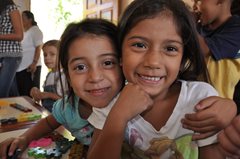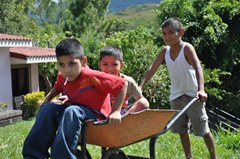A diverse population
Nicaragua is the largest country in Central America. The total population is around six million, with roughly 2.4 million Nicaraguans living in the city of Managua, thus making it Central America’s second largest capital after Guatemala City.
The country is home to a number of indigenous groups, including the Miskitos, who predominantly live on the Caribbean Coast, the Ramas and the Sumos.
The official language in Nicaragua is Spanish; nonetheless Miskito, Creole, Sumo and Rama are commonly used by the respective ethnic minorities in specific parts of the country. Due to its geographic location, Nicaragua is frequently affected by violent hurricanes and earthquakes.
Dictatorship, civil war and natural disasters
SOS Children’s Villages started its activities in Nicaragua only one year after a devastating earthquake had hit the capital of Managua, leaving nearly 20,000 Nicaraguans dead and a further 280,000 without a home. Only a few years later, in 1978, civil war broke out, which brought the five-decade long brutal dictatorship of the Somoza family clan to an end. This civil war, many years of dictatorship and the tremendous damage caused by Hurricane Mitch in 1998 left the country in a precarious economic situation.
With over 20 per cent of the total population living in poverty, Nicaragua is now one of the poorest countries in Latin America. Food scarcity remains a significant problem with 17 per cent of the population suffering from undernourishment - one of the highest percentage in Central America. Especially in rural Nicaragua, poverty is omnipresent: many people do not have access to clean drinking water and sanitation.
Children in need of support and protection
The government of Nicaragua ratified the UN Convention on the Rights of the Child in 1990 and education is compulsory and free of charge up to the age of 12.
Although the country’s Labour Code asks for parental consent before children under 15 are legally entitled to work, and the country has increased its efforts to fight child labour, Nicaraguan reality continues to be quite different.
According to recent studies, approximately 219,000 Nicaraguan children aged 5-14 are involved in child labour activities. Three in five Nicaraguan children are employed in the agricultural sector, working mostly in the banana, cotton and tobacco industry.
Others wander the streets of Managua where they sell merchandise or clean car windows for a few pesos. Thousands of homeless children roam the streets without access to food, education or family support. Most of them sniff glue in order to forget about their daily hardships.
SOS Children's Villages in Nicaragua
SOS Children's Villages has been present in Nicaragua since the early 1970s.
Strengthen families: We work with local groups to support families who are at risk of breaking down. Our assistance includes day care for young children, material help and counselling and advice for parents and children.
Care in families: If, in spite of all support, children cannot live with their families, they can find a new home in one of the SOS Children’s Villages, where they are cared for by their SOS parents.
Education: We aim to ensure that all children in our programmes attend school. In Esteli we also run a primary and secondary school.
Support for young people: We provide young people with support and training until they are able to live independently.


